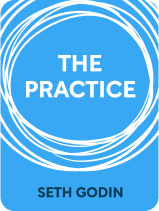

This article is an excerpt from the Shortform book guide to "The Practice" by Seth Godin. Shortform has the world's best summaries and analyses of books you should be reading.
Like this article? Sign up for a free trial here.
Do you have an artistic voice? How can you find your artistic voice?
An artistic voice can make your creative work better, according to Seth Godin in The Practice. If you trust your own voice, you’ll be able to create something unique that will stand out.
Read below to learn how to find your artistic voice.
Use Your Artistic Voice
Part of trusting yourself is trusting your voice. Society has trained most of us to blend in, but to do creative work, you need to use a distinctive voice. Godin advises that you don’t try to mimic other people; this is a way of hiding your true voice. If you don’t trust your voice or you haven’t found it yet, it’s easy to justify being silent. But finding your artistic voice and engaging with others will help you find your voice and make your creative work better.
Using your specific voice and contributions also helps create diversity. Diversity of thoughts, experiences, cultures, and so on, increases the likelihood of solving difficult problems. If enough different people get together, they’ll probably create something new. A more homogenous group, on the other hand, might not come up with as many unique, creative ideas.
It’s important to note that sharing your unique voice doesn’t always mean sharing your “authentic” voice. There’s a common misconception that successful artists should strive for authenticity by sharing their innermost thoughts and feelings. But Godin points out that very few things are truly authentic—almost everything we do is the result of a series of intentional choices. Art itself is inauthentic in the sense that you are inventing something that appears real. Godin advises that you create art in such a way that the audience has an authentic experience—which doesn’t necessarily involve using your authentic voice.
For example, if you wanted to write an effective personal essay, you wouldn’t just tear a page out of your journal containing your unfiltered, authentic thoughts. You would need to make choices about the structure of your essay and what dialogue and characters to include. You’d need to decide which of your inner thoughts the reader needs to know and which don’t serve the story. Your writing voice itself takes practice to discover. While it certainly isn’t “fake,” neither is it the voice you use in everyday life.
(Shortform note: At first glance, Godin’s advice appears inconsistent: He seems to be saying that you should speak in your own, true, voice but also that your voice doesn’t need to be authentic to be successful. Upon closer examination, however, Godin seems to be using the word “voice” in two different ways here—in the first instance, to mean what you have to say (your ideas, life experiences, desires, and opinions), and in the second, to mean how you say it. Indeed, artists often use “voice” in a variety of ways to mean different things. For example, Vivian Gornick’s The Situation and the Story, a book on writing, distinguishes between your authorial voice on the page and your everyday voice (such as the voice you use to speak to your spouse or neighbors).)

———End of Preview———
Like what you just read? Read the rest of the world's best book summary and analysis of Seth Godin's "The Practice" at Shortform.
Here's what you'll find in our full The Practice summary:
- Why creativity doesn't require any “magic”
- How creativity is a skill that anybody can learn
- Step-by-step lessons on how to be creative






